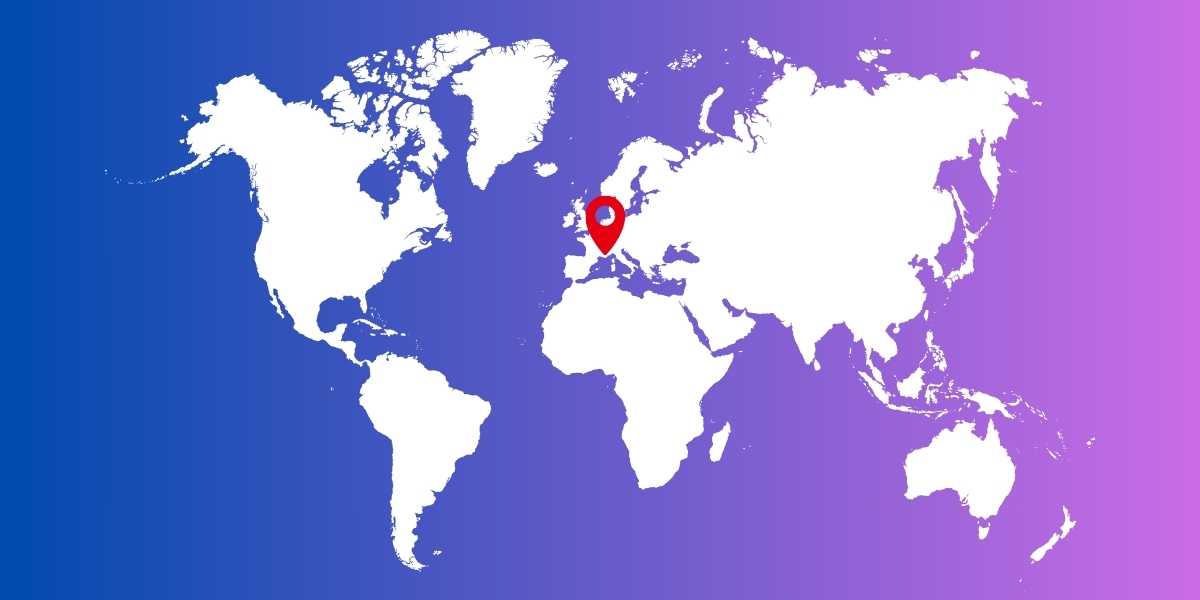
Online & crypto gambling regulations in Europe
European countries, even those that are members of the European Union, take different approaches to online and crypto gambling. EU member states are autonomous in the way they organize online gambling, and most of them allow at least some form of internet wagering.
The following article contains a detailed overview of crypto and online gambling regulations across Europe, including:
- How the market is regulated
- Tax rates
- Proposed legislation
What is MiCA and what you should know about it?
MiCA (Markets in Crypto-Assets Regulation) is the EU’s first crypto law, designed to standardize regulations across all member states.
Tether, the most traded cryptocurrency, with a trading volume exceeding the staples Bitcoin and Ethereum combined, cannot comply with the regulations and is getting delisted from major European crypto exchanges.
Crypto traders and casino players are already asking the real question: will MiCA mess with their trading positions or make it harder to gamble online?
The short answer is no, but it depends on your jurisdiction.
So, without further ado, let’s check out the data behind all European countries:
Legal statuses certified by Eterna Law
The information on the legal status of online and crypto gambling for the following five countries has been reviewed and fact-checked by Artem Kuzmenko, partner of the international law firm, Eterna Law, and head of the gambling division.
France
Online Gambling Status: Legal (certain forms of betting)
As it stands, most online casinos remain strictly prohibited in France. However, the country allows for certain forms of online gambling, including sports betting, horse racing wagering, and online poker, through authorized operators. Additionally, licensed land-based casinos operate legally within the country.
In response to the growth of the black market, France’s National Assembly is to consider a bill that could lead to the legalization of online casinos in the country. As of March 2025, the bill is still on hold.
Crypto: France is generally viewed as favorable towards cryptocurrency assets. Despite lacking comprehensive regulation, authorities refrain from systematic actions against cryptocurrencies.
While cryptocurrencies do not hold the status of legal tender, businesses in France have the option to accept them as a means of payment for their services, provided they adhere to relevant laws and regulations.
Crypto & Gambling: France’s gambling regulatory body has issued a public advisory cautioning against the use of two online gaming platforms that facilitate cryptocurrency transactions.
The regulator’s directive underscores that cryptocurrency payments are prohibited and contravene anti-money laundering principles established by law.
Germany
Online Gambling Status: Legal
Germany recently adopted legislation in 2021 that legalized gambling within its borders. However, the regulatory environment is characterized as the most restrictive in the world.
For instance, stringent regulations dictate that players are limited to depositing no more than €1,000 per month, with slot machine stakes capped at 1€ per spin. Additionally, operators face restrictions such as a mandatory 5-second delay between spins.
Crypto: In contrast to some European counterparts, Germany has taken proactive steps toward regulating cryptocurrencies. Regulatory authorities classify cryptocurrencies as financial instruments or assets, subjecting them to laws and regulations governing securities and investments.
Crypto & Gambling: Germany’s online gambling regulations explicitly prohibit the use of anonymous payment solutions for gambling purposes. However, cryptocurrencies are not included in this restriction.
Consequently, there are currently no constraints on using cryptocurrencies to fund online casino gambling accounts. Nevertheless, cryptocurrency payments within the gambling industry are primarily processed by Curaçao-licensed bookmakers, often framed as a conditional sale of an asset or unit of account.
Italy
Online Gambling Status: Legal
Italy holds the distinction of being the first EU member state to formally legalize online casinos at the legislative level.
Italy prides itself on possessing one of the most contemporary, transparent, and competitive regulatory frameworks for gambling across the European Union. Governed by the Autonomous Administration of the State Monopolies.
Within Italy’s regulatory landscape, operators, referred to as ‘concessionaires,’ are subject to regulation at three distinct tiers: national legislation, regional statutes, and municipal provisions.
Crypto: Italy’s legal system presently lacks a comprehensive definition of cryptocurrencies or crypto assets, with no immediate plans for clarification until the implementation of MiCA.
Under present regulations, Italian law imposes no constraints on the acquisition, sale, or possession of cryptocurrencies, granting citizens the freedom to engage in these activities without restrictions.
Crypto & Gambling: The intersection of cryptocurrency and gambling in Italy resides within a regulatory gray zone. Although Italian gambling laws make no explicit reference to cryptocurrencies, they often frame regulations around euros in aspects such as spending limits, maximum winnings, and self-limitation measures.
Spain
Online Gambling Status: Legal
In Spain, the online gambling sector, encompassing activities like slots and poker, received official legalization under the Spanish Gambling Act, subject to the appropriate local licenses.
Foreign operators are prohibited from offering gambling services in Spain under foreign licenses.
Crypto: Spain’s legal framework currently does not assign cryptocurrencies the status of money, financial instruments, or value. Consequently, companies dealing with cryptocurrencies in Spain are not subject to general authorization requirements.
Crypto & Gambling: While there are no specific restrictions on payment methods for gambling in Spain, cryptocurrencies are not permitted as valid payment options.
United Kingdom
Online Gambling Status: Legal
In the United Kingdom, all forms of gambling are legal and regulated by the UK Gambling Commission. The UK provides one of the most prestigious and trusted jurisdictions for the gambling industry due to its strict but fair approach to regulation and transparency.
Crypto: The United Kingdom has implemented comprehensive legislation concerning cryptocurrencies, signaling a robust determination to establish itself as a leading “crypto hub.” Despite this ambitious endeavor, the regulatory framework for crypto assets remains somewhat incomplete, as it does not encompass all categories of crypto assets and their associated operations.
Crypto & Gambling: The regulatory authority exercises strict oversight over the payment mechanisms permissible for British gamblers, with cryptocurrencies presently excluded from the approved list of payment methods.
Other European Countries
Now, let’s have a look at the legal status of online and crypto gambling in other European countries:
Disclaimer: This article was last fact-checked by our team on April 4, 2025. Please note that legal frameworks related to gambling and digital currencies are subject to change.
Albania
Online Gambling Status: Legal (only sports betting)
Crypto Gambling Status: Unknown
In February 2024, the Albanian parliament voted to reinstate online gambling after the blanket ban back in 2018. However, only 10 sports betting sites are to be allowed.
The new law specifies that “online sports bets are bets placed on dedicated, authorized, and monitorable websites, applications or electronic platforms of licensed entities, in accordance with the provisions of this law, for sports events and/or sports games … and do not include track races.”
As for crypto gambling, there are no clear laws surrounding gambling with cryptocurrencies. However, Bitcoin and other cryptos are legal to hold and trade in the country.
Andorra
Online Gambling Status: Legal
Crypto Gambling Status: Illegal (although they’re in a transitional phase)
Andorra is a microstate that has a very strong gambling tradition. Land-based and online gambling are legal and regulated in Andorra, according to provisions of Law 28/2012 and Law 4/2021. All gambling activities in the country are regulated by the Consell Regulador Andorrà del Joc (CRAJ).
The Digital Assets Act (Law 24/2022), approved on June 30, 2022, and effective from October 20, 2022, provides a comprehensive legal framework for the issuance, custody, exchange, and supervision of digital assets.
Armenia
Online Gambling Status: Legal
Crypto Gambling Status: Illegal (although they’re in a transitional phase)
Online gambling is legal in the Republic of Armenia, according to the laws of RA and Decree 1164-N of the GoA on gambling. Despite offering legal online and land-based gambling, Armenia has adopted an anti-gambling policy towards advertisements for betting.
The intersection of cryptocurrency and online gambling in Armenia remains complex. While both sectors are now regulated, there is no explicit legal framework addressing the use of cryptocurrencies for gambling transactions. However, the Central Bank of Armenia is mulling over the introduction of Central Bank Digital Currency (CBDC), which could lead to the implementation of cryptocurrencies into the gambling framework.
Austria
Online Gambling Status: Legal (state-controlled monopoly)
Crypto Gambling Status: Legal
All gambling in Austria is regulated under the Austrian Gaming Act, according to which the Casinos Austria AG and Österreichische Lotterien GmbH, state-owned gambling companies, hold a monopoly over sports betting, casinos, and lotteries.
Cryptocurrencies are accepted as a means of exchange, and cryptocurrency holdings are counted as income from capital assets and, as such, are subject to a tax rate of 27.5%.
Azerbaijan
Online Gambling Status: Illegal (with the exception of lotteries and sports betting)
Crypto Gambling Status: Illegal
Azerbaijan has held a general prohibition on gambling since 1998. In 2011, the country decided to approve sports betting. The only legal operator in the country is eTopaz. Online casinos remained outlawed.
As for crypto, Azerbaijani authorities classify cryptocurrencies as intangible assets. However, in an effort to integrate the cryptocurrency sector into the formal economy, the government is developing new tax regulations.
Belarus
Online Gambling Status: Legal
Crypto Gambling Status: Illegal
In 2019, Belarus legalized all forms of online gambling, including online casinos and sports betting.
Belarus has positioned itself as a progressive jurisdiction regarding cryptocurrency regulation. The Presidential Decree on the Development of the Digital Economy, enacted in 2018, legalized various cryptocurrency activities, including mining and trading. It’s worth noting that Belarus is marketing itself as a crypto mining hub recently.
Belgium
Online Gambling Status: Legal
Crypto Gambling Status: Legal
Gambling in Belgium falls under the purview of the Gambling Act of 7 May 1999. By way of amendments to the law in 2011, online gambling was approved, and in 2019, a clear distinction between online casino gambling and sports betting was introduced. All operators must be licensed and regulated by the Gaming Commission (GC).
There are no specific laws and regulations regarding gambling with cryptocurrencies in Belgium. Crypto exchanges are allowed under the Virtual Currency Royal Decree of 2022.
Belgium imposes a 33% flat tax on capital gains from most cryptocurrency transactions. Certain activities, such as mining or professional trading, may be subject to income tax rates ranging from 25% to 50%
Bosnia and Herzegovina
Online Gambling Status: Legal
Crypto Gambling Status: Legal
Gambling is regulated in Bosnia and Herzegovina in both of its entities – the Republic of Srpska and the Federation of Bosnia and Herzegovina. Since 2022, the Republic of Srpska has changed the law to include virtual currencies, whereas the Federation is still to act on the laws surrounding cryptocurrencies.
However, there’s no mention of virtual currencies as accepted currency for gambling in either of the entities.
Bulgaria
Online Gambling Status: Legal
Crypto Gambling Status: Legal
Bulgaria first legalized gambling in 1993, and in 2012, Bulgaria’s parliament adopted a new gaming act to legalize online gaming. All operators must obtain a license from the National Revenue Agency (NRA), which assumed the powers of the former abolished State Commission on Gambling in 2020.
In Bulgaria, there are no specific laws regarding the use of virtual currencies for gambling, that is, cryptocurrencies. The taxation of the latter in Bulgaria remains ambiguous due to the absence of specific regulations.
Croatia
Online Gambling Status: Legal
Crypto Gambling Status: Legal
Croatia has robust gambling legislation with online and land-based sportsbooks and casinos approved for taking bets. Foreign operators who obtain a license from the Ministry of Finance are also eligible to enter the market.
Croatia doesn’t have a specific law regarding cryptocurrencies, and the regulated operators don’t support such payments. However, Croatia’s income tax law treats cryptocurrencies as a form of investment and, as such, subject to taxes based on capital gain.
Cyprus
Online Gambling Status: Illegal
Crypto Gambling Status: Illegal
Under the Betting Law of 2012, Cyprus legalized online and offline sports betting, thus establishing the National Betting Authority to oversee sports wagering in the country. In 2015, the legislators voted to approve the Cyprus Casino Control Law and accompanying regulations that refer to licensing a single operator that will build an integrated casino resort and smaller satellite casinos. Online casinos remain outlawed.
Currently, the main piece of legislation that addresses the issue of cryptocurrencies in the state is the Prevention and Suppression of Money Laundering and Terrorist Financing Law. Under the provisions of the law, all persons who hold crypto assets must be registered with the Cyprus Securities and Exchange Commission, which is in direct conflict with the very anonymous nature of cryptocurrencies.
Czech Republic
Online Gambling Status: Legal
Crypto Gambling Status: Legal
In Czechia or the Czech Republic, gambling is regulated by Act No. 186/2016 Coll., on gambling, also known as the Czech Gambling Act. Land-based and online gambling is legal. The taxes levied on the gambling operators are set to 23% for every game other than those defined as technical games, for which taxes are 35%.
Gambling winnings are subject to a 15% income tax. Illegal operators must be banned, as per the guidelines from the Ministry of Finance. Czechia has implemented advanced cryptocurrency laws that mostly refer to the Virtual Asset Service Providers (VASPs), individuals, and companies that facilitate exchanges of virtual currencies.
The Czech National Bank (CNB) is the supervisory and regulatory body tasked with enforcing Anti-Money Laundering (AML) and Know-Your-Customer (KYC) regulations for VASPs.
Denmark
Online Gambling Status: Legal
Crypto Gambling Status: Legal
Denmark boasts one of the most developed gambling markets in Europe. The Danish Gambling Act defines the rules surrounding the operation of online casinos, land-based casinos, sports betting, lotteries, and other licensed forms of gambling in the country.
According to the statistics issued by the Danish regulator, Spillemyndigheden, Danes gambled more than 65.6 billion DKK since the regulation of the industry in 2012.
Cryptocurrencies are subject to “legislation on alternative investment funds, prospectuses, and money laundering” and, as such, are subject to income tax when you trade in cryptocurrencies. Still, no licensed operators offer cryptocurrencies as a means of payment.
Estonia
Online Gambling Status: Legal
Crypto Gambling Status: Legal
Through its Gambling Act, Estonia has regulated games of chance, Toto i.e. sports betting, lottery, games of skill, and commercial lottery, taking place online and offline.
All operators must secure a permit from the Estonian Tax and Customs Board prior to launching their services. No licensed operators offer cryptocurrency payment methods, despite the fact that Estonia was the first country to start issuing crypto licenses and gambling using crypto is supposedly legal.
In alignment with the European Union’s Markets in Crypto-Assets Regulation (MiCAR), Estonia has set a transition period allowing existing virtual currency service providers to operate under their current authorizations until July 1, 2026.
Finland
Online Gambling Status: Legal (current state-owned monopoly on gambling)
Crypto Gambling Status: Unclear
In Finland, gambling services are regulated under the Lotteries Act and are provided solely by the state-controlled company Veikkaus Oy, and it has been so for the past 70 years. However, in March 2025, the government submitted a bill to Parliament proposing the dismantling of Veikkaus’ exclusive control over online sports betting and digital slot machines
In Finland, virtual currencies are subject to income tax, obtained either through mining or through currency exchanges, which are perfectly legal in the country. However, it is unclear whether it’s legal to gamble using crypto.
Georgia
Online Gambling Status: Legal (heavily regulated)
Crypto Gambling Status: Illegal
Georgia boasts a huge gambling market worth over 32 billion lari, or $10 billion. Gambling is regulated in accordance with the nation’s Revenue Service and the Tax Code of Georgia. Online and land-based casinos, sportsbooks, bingo, and lotteries are tentatively approved, for now.
Recently, the Ministry of Finance has announced the tightening of gambling laws, prohibiting individuals under the age of 25, socially vulnerable citizens, public employees, and those blacklisted by courts or those in self-exclusion programs from participating in all gambling activities, which is some 1.5 million Georgians.
Cryptocurrencies are not legal tender in Georgia but are rather considered digital assets that you can use only through licensed Virtual Asset Service Providers (“VASP”).
Greece
Online Gambling Status: Legal
Crypto Gambling Status: Unclear
According to regulations No 8/6/25.05.2012, the Hellenic Gaming Commission is mandated by law to issue licenses for casinos and sports betting operators. In 2020, a new licensing regime for online operators kicked in, with two licensing agreements, one for online sports betting sites and one for all other types of iGaming.
Based on the data from HGC, the gambling market in 2020 was worth €540 million. The licensing process involves an application fee of approximately €10,000, with an annual fee of around €17,500 for B2C licenses
No provisions of the law refer to cryptocurrency gambling, and no licensed operator offers them as a means of payment.
Hungary
Online Gambling Status: Legal
Crypto Gambling Status: Illegal
In January 2023, Hungary amended Act XXXIV of 1991 on Gambling Operations, known as the Gambling Act, in order to end the state-run monopoly over gambling in the country.
According to the previous legislation ruled in conflict with Article 56 of the Treaty and Functioning of the European Union (TFEU) by the Court of Justice of the European Union (CJEU), only the state-run Szerencsejáték Zrt could provide retail and online sports betting in the country. Now, a new licensing regime is in place, which opens the market to EU-based operators.
Despite these regulatory advancements, as of March 2025, no foreign operators have applied for a Hungarian online sports betting license. These operators are not allowed to offer payments in crypto, as these are regulated as crypto assets, not legal tender. Cryptocurrency exchanges are subject to a 15% income tax in Hungary.
Iceland
Online Gambling Status: Illegal
Crypto Gambling Status: Illegal
All forms of gambling in Iceland, excluding the state-approved three-monthly lotteries and sports pools, are illegal and banned. However, there haven’t been any instances where the government has prosecuted individuals for betting on offshore sites.
Аs for crypto, Iceland has joined the Crypto-Asset Reporting Framework Multilateral Competent Authority Agreement (CARF-MCAA), effective January 1, 2025. This agreement mandates platforms to report income distributed to sellers.
Ireland
Online Gambling Status: Legal
Crypto Gambling Status: Unknown
The Gambling Regulation Act 2024 represents a comprehensive overhaul of Ireland’s gambling laws, consolidating various regulations into a unified framework.
The Act imposes strict controls on gambling advertisements, notably banning ads on television and online between 5:30 am and 9:00 pm to protect vulnerable groups, including minors. Additionally, social media advertising is restricted, requiring adult customers to opt-in to receive online ads.
The regulation offers no insight into the rules regarding cryptocurrency payments. The Central Bank of Ireland is designated as the National Competent Authority (NCA) for the authorization and supervision of crypto assets, as per the EU’s Markets in Crypto-Assets Regulation (MiCAR).
Kazakhstan
Online Gambling Status: Illegal
Crypto Gambling Status: Illegal
In 2007, the Kazakhstan government approved the establishment of two gambling zones in the Shuchinskiy district (Akmola region) and the Kapchagai reservoir coast (Almaty region) where land-based casinos and retail sportsbooks can operate. There’s a complete prohibition on offshore bookmakers and online casinos, with organizers of online casinos facing criminal liability, including imprisonment for up to two years.
Under the new law on digital assets in Kazakhstan, cryptocurrencies are deemed as digital assets that users can exchange only through exchanges licensed by the Astana International Financial Centre (AIFC.) Companies registered within the AIFC benefit from a 0% corporate tax rate for financial services and VAT exemptions. The use of cryptos for gambling is not specifically regulated.
Kosovo*
Online Gambling Status: Illegal
Crypto Gambling Status: Illegal
In March 2019, the Assembly of Kosovo enacted the Law on Prohibition of Gambling, which came into effect on May 10, 2019. The legislation prohibits all forms of gambling, including casinos and betting shops, across the country. The ban was instituted following concerns over criminal activities linked to gambling establishments.
The only exception to this ban is the state-controlled lottery, Lotaria e Kosoves, which remains legal and offers both offline and online lottery games to residents aged 18 and above.
On March 12, 2024, Draft Law No. 08/L-295 “On Crypto-Assets” was proposed to the Assembly of Kosovo. As of April 2025, the law has not yet been enacted.
Latvia
Online Gambling Status: Legal
Crypto Gambling Status: Unclear
In 2005, the Latvian government issued a new Gambling and Lottery law, legalizing online and offline casinos and sports betting. In September 2024, the Latvian government approved amendments to raise the legal gambling age from 18 to 21.
No licensed operator in the country accepts crypto payments. Latvia is aligning its cryptocurrency regulations with the European Union’s Markets in Crypto-Assets Regulation (MiCA). The Bank of Latvia has been designated as the national competent authority under MiCA, with the Crypto-Asset Service Law introducing authorization fees and supervisory measures.
Liechtenstein
Online Gambling Status: Illegal
Crypto Gambling Status: Illegal
In December 2023, the Liechtenstein government extended the ban on online gambling until the end of 2028. Consequently, the issuance of licenses for online gambling operators is postponed, effectively prohibiting local online gaming businesses during this period.
Starting January 7, 2025, Liechtenstein and Switzerland implemented a reciprocal agreement to enforce gaming bans across both countries. Individuals banned in one country are also prohibited from gambling in the other.
The Liechtenstein Blockchain Act is the country’s comprehensive cryptocurrency law that sets the stage for the widespread use of cryptos in gambling, once online gambling kicks off.
Lithuania
Online Gambling Status: Legal
Crypto Gambling Status: Illegal
With the 2021 amendments to Lithuania’s gambling legislature – the Seimas, online gambling achieved a major milestone. Now, there can be online-only operators, so there’s no need to team up with retail gambling providers.
Effective July 1, 2025, the legal gambling age will be raised from 18 to 21 for all forms of gambling, except for the national lottery. In January 2025, Lithuania approved an amendment requiring financial institutions to block all payment card transactions from unregulated gambling operators
As for crypto, Lithuania imposes a non-taxable threshold of €2,500 for capital gains from the sale of personal assets, including cryptocurrencies. Income exceeding this limit is subject to a flat tax rate of 15%.
Luxembourg
Online Gambling Status: Legal (only via the National Lottery (Loterie Nationale))
Crypto Gambling Status: Illegal
Gambling in Luxembourg is mainly regulated through the 1977 Gambling Law, which prohibits all forms of gambling. However, under the Grand-Ducal Regulation from 1977, the legal framework was adopted for land-based casinos, and the country’s only venue is Casino 2000.
In 2009, the National Foundation and the National Lottery Law granted the National Lottery exclusive right to offer lotteries and sports betting both in their retail and online forms.
On February 6, 2025, Luxembourg enacted a law designating the Commission de Surveillance du Secteur Financier (CSSF) as the competent authority for MiCA compliance. CASPs must obtain authorization from the CSSF to operate, with a transitional period until July 1, 2026, to adapt to the new requirements.
Malta
Online Gambling Status: Legal
Crypto Gambling Status: Legal
Malta approves all forms of gambling and is one of the main hubs of online gambling in Europe. Malta’s Gaming Act defines all rules and regulations of gambling. Malta Gaming Authority is in charge of licensing both local and offshore operators with headquarters on the island.
In fact, Malta allows gambling with cryptocurrency, as per the country’s Sandbox Framework, making it a leader in the field of cryptocurrency gambling.
In March 2025, the MGA updated its regulatory approach to place a stronger emphasis on sports betting integrity and anti-money laundering (AML) measures. A month later, in April 2025, the Malta Financial Services Authority (MFSA) fined OKX’s European subsidiary €1.05 million for past AML breaches.
Moldova
Online Gambling Status: Legal
Crypto Gambling Status: Illegal
The gambling sector in Moldova is regulated under Law No. 291/2016. However, in 2018, the country concluded that Moldova’s Public Property Agency, APP, should no longer hold a monopoly over lotteries and gambling in the country and should instead enter a public-private partnership with EU-based companies.
In January 2025, the Moldovan Parliament approved the first reading of a draft law to lift certain restrictions on gambling advertising, particularly for low-risk verticals.
As for crypto, the country prohibited individuals and legal entities from dealing with cryptocurrencies, as per Law No. 66.
Monaco
Online Gambling Status: Legal
Crypto Gambling Status: Illegal
Monaco is famed for its casinos, and all tourists and residents born outside of Monaco can gamble in land-based casinos, as per Act no. 1.103 of 12 June 1987 pertaining to gambling.
Individuals in Monaco are not subject to capital gains or income taxes; thus, they are not required to report cryptocurrency holdings or transactions. However, businesses dealing with cryptocurrencies must adhere to AML and KYC obligations overseen by the Autorité Monégasque de Sécurité Financière (AMSF).
Montenegro
Online Gambling Status: Legal
Crypto Gambling Status: Unclear
Gambling is legal in Montenegro, encompassing casino games, online gambling, and sports betting. The industry has evolved significantly since its regulation in 2010.
In February 2025, the Montenegrin government proposed a new Law on Gambling aimed at modernizing the regulatory framework. The proposal is pending parliamentary approval, expected by the end of Q1 2025.
On February 28, 2025, Montenegro amended its Anti-Money Laundering (AML) law to include provisions for crypto assets. Service providers related to crypto assets are now required to register before commencing operations.
Netherlands
Online Gambling Status: Legal
Crypto Gambling Status: Unclear
Gambling in the Netherlands is legal and regulated under the Betting and Gambling Act and the Betting and Gambling Tax Act. On April 1, 2021, changes to the bills were introduced to allow remote gambling in the Kingdom of Netherlands. The so-called Remote Gambling Act came into force on April 1, 2021, and the first licenses were issued by the Kansspelautoriteit, the country’s chief regulators, in October 2021.
Cryptocurrency transactions are allowed in the Netherlands, but there are no clear crypto gambling laws.
North Macedonia
Online Gambling Status: Legal
Crypto Gambling Status: Illegal
Online casinos, lotteries, and sportsbooks are legal in North Macedonia, pursuant to the Law of Chance and Entertainment Games of the Republic of North Macedonia. All operators must obtain adequate licenses from the Ministry of Finance prior to launching.
Cryptocurrencies are not legal tender in North Macedonia, and their use for payments is not permitted.
Norway
Online Gambling Status: Legal (offered only by Norsk Tipping AS and Norsk Rikstoto)
Crypto Gambling Status: Illegal
According to the Norwegian Gambling Act, esports betting, casino games, number games, and horse betting are legal in Norway, provided they are offered by Norsk Tipping AS and Norsk Rikstoto. The Norwegian Gambling Authority (regulator Lotteri-og stiftelsestilsynet (Lotteritilsynet) is charged with overseeing the gambling activity in the country.
In April 2025, the Norwegian gambling regulator, Lotteritilsynet, ordered the blocking of 57 unlicensed online gambling websites operating illegally within the country.
Cryptocurrencies are considered capital assets in Norway. Consequently, any gains or income derived from crypto assets are taxed as ordinary income at a flat rate of 22%
Poland
Online Gambling Status: Legal (state-monopoly)
Crypto Gambling Status: Unclear
All gambling activities, including games of chance, betting, card games, and games on gaming machines, are legal in Poland, and fall under the jurisdiction of the Gambling Law of 19 November 2009. All operators must obtain a license from the Ministry of Finance before offering their services to Poles.
As of July 1st, 2017, the government has blacklisted close to 29,000 URL addresses, mostly offshore gambling sites, which are the only ones offering cryptocurrency gambling. The current financial laws of the country do not specifically address crypto-assets.
Portugal
Online Gambling Status: Legal
Crypto Gambling Status: Illegal
Gambling in Portugal is legal in all of its forms. Land-based gambling and betting are regulated by Decree-Law No. 422/89 and Decree-Law No. 31/2011, whereas online casino gambling and betting are regulated under the provisions of Decree-Law No. 66/2015. The Gambling Regulation and Inspection Service is responsible for controlling and regulating all gambling options in the country.
In 2023, Portugal’s new tax rules regarding crypto assets came into effect, taxing receiving crypto assets in exchange for selling other crypto assets at 15%. No licensed operators in the country accept crypto payments.
Romania
Online Gambling Status: Legal
Crypto Gambling Status: Unclear
Gambling in Romania is entirely legal as per GEO 77/2009, and organized under the supervision of the National Office for Gambling (O.N.J.N.), mandated by law to license operators and providers.
In March 2025, Romania adopted Emergency Ordinance No. 10/2025 (GEO 10/2025), amending AML Law No. 129/2019 to align with the EU’s Transfer of Funds Regulation (TFR) and Markets in Crypto-Assets Regulation (MiCA).
Russia
Online Gambling Status: Legal (partially allowed in gambling zones)
Crypto Gambling Status: Illegal
Russia banned all gambling in 2006 following major legal reforms. Online gambling is entirely prohibited, and the only forms of sanctioned gambling are state lotteries, casino and EGM operations in gambling zones, and sportsbooks that can operate under the Interactive Bet and TSUPIS systems.
Cryptocurrency gambling is outright banned. Payments in crypto have been banned since 2022.
San Marino
Online Gambling Status: Legal
Crypto Gambling Status: Illegal
San Marino has regulated land-based and online gambling as per Law No. 67/2000 Regulations For The Exercise Of The Games, Contest Prize, The Lottery, The Lottery, Games Of Chance and Skill and Betting. In 2014, amendments to the law were introduced to allow online gambling.
According to the country’s decree on blockchain technology, cryptocurrencies are approved for use. However, cryptocurrencies are not legal tender in the country and can’t be used for gambling.
Serbia
Online Gambling Status: Legal
Crypto Gambling Status: Illegal
Serbia adopted a new Law on Games of Chance in 2020 which provides a detailed overview of all forms of gambling in the country. The list of approved games includes land-based and online casinos and sportsbooks, lottery, bingo, raffles, and other types of classic games. The Games of Chance Administration of the Ministry of Finance is in charge of regulating the market.
Offshore casinos are blacklisted by Serbia’s Ministry of Finance, and those are the only ones offering cryptocurrency gambling. Bitcoin and other cryptocurrencies are not legal tender in the country and are regulated according to the law on digital property.
Slovakia
Online Gambling Status: Legal
Crypto Gambling Status: Illegal
Slovakia adopted a Gambling Act on gambling on January 29, 2019, legalizing casino gambling, sports betting, lotteries, and other forms of gambling. Foreign operators are entitled to apply for a license to operate in Slovakia with the Office for the Regulation of Gambling. The only monopoly that remains is the one on numerical lotteries, special bingo, and receipt lotteries.
Cryptocurrencies, dubbed as crypto-assets, are subject to a 7% income tax rate but are not legal tender and can’t be used for gambling.
Slovenia
Online Gambling Status: Legal (state-owned monopoly)
Crypto Gambling Status: Unclear
Slovenia has legalized classic games of chance (Lotteries and Betting), as well as numerical lotteries, instant lotteries, quiz lotteries, bingo games, lotto games, sports betting, raffles, and other similar games, as per the Gaming Act. The Financial Administration of the Republic of Slovenia oversees gambling in the country.
As of 1 January 2022, Slovenia implemented a new law on digital currencies, where a 10% flat tax rate is imposed. There are no clear laws regarding gambling with cryptocurrency.
Sweden
Online Gambling Status: Legal
Crypto Gambling Status: Illegal
Gambling in Sweden is regulated under the following laws: the Lotteries Act (1994:1000), the Act on Arrangements for Certain Gaming Machines (1982:636), the Casino Act (1999:355), and the Swedish Gambling Act of 2018, which came into effect on 1 January 2019.
In February 2025, the Swedish government initiated a review of the Gambling Act to enforce stricter policies against unlicensed operators and enhance consumer protections.
The current data show that gross gaming revenue (GGR) is SEK 27,353 million. However, gambling using cryptocurrencies is not sanctioned in the country, despite its favorable view of cryptocurrencies and the growing number of licensed exchanges.
Switzerland
Online Gambling Status: Legal
Crypto Gambling Status: Illegal
Gambling in Switzerland is governed by the Federal Act on Games of Chance and Casinos of 18 December 1998, and the amended version of the 2018 Federal Act on Gambling (Gambling Act), which ushered online gambling in the country.
Foreign operators that don’t have a license from the Swiss Gambling Supervisory Authority (Gespa) are banned from the market, as per the decision of the Federal Supreme Court.
Switzerland treats cryptocurrencies as assets rather than securities through its Blockchain Act, which made it one of the first countries to introduce legislation on digital currencies. However, players are not allowed to use cryptos for gambling.
Turkey
Online Gambling Status: Illegal (with the exception of the state-run lottery and the state-owned sports betting company, the IDDAA)
Crypto Gambling Status: Illegal
Commercial gambling in Turkey is illegal except for the state lottery (Milli Piyango) and the state-run sports betting company, the IDDAA.
Effective February 25, 2025, Turkey implemented the FATF-aligned Travel Rule, requiring Virtual Asset Service Providers (VASPs) to collect and verify sender information for cryptocurrency transfers equal to or exceeding 15,000 Turkish Lira.
Ukraine
Online Gambling Status: Legal
Crypto Gambling Status: Unclear
In March 2025, Ukraine established a new state agency named “PlayCity” to oversee and regulate gambling and lottery activities, succeeding the previously dissolved Commission for the Regulation of Gambling and Lotteries (CRGL).
Effective April 1, 2025, Ukraine introduced stringent advertising regulations for gambling operators, including prohibitions on using patriotic themes, war-related topics, and involving military personnel in advertisements.
Gambling using cryptocurrencies is not addressed in a legal framework.
Final Thoughts
Playing from outside of Europe and wondering if your own country allows crypto gambling?
We’ve got you covered if you’re playing from:








